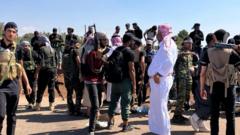Bedouin fighters stationed outside the troubled city of Suweida in southern Syria have conveyed to BBC that they will adhere to a ceasefire with the local Druze community, yet remain open to resuming conflict if their demands are not met. Following a week of intense sectarian violence that resulted in significant casualties, the Bedouins have retracted to nearby villages. The clashes involved the Druze, Bedouin fighters, and government forces, with airstrikes from Israel supporting the Druze side.
According to a UK-based monitoring organization, the region is experiencing a "cautious calm," although sporadic attacks on villages by tribal fighters were reported. Smoke could be seen billowing from the city, a stark reminder of the violent clashes that have marred the area. Security personnel deployed by the Syrian government have fortified checkpoints, preventing the Bedouin fighters from entering the city again.
Amid growing unrest, the Bedouin fighters are pressing for the release of their injured members still in Suweida, whom they refer to as hostages. The ongoing tensions trace back to the abduction of a Druze merchant on the Damascus road, which ignited the recent violence.
As the situation stands, the interim government led by President Ahmed al-Sharaa has sent forces to Suweida to restore order following the deadly conflict that has claimed over 1,120 lives, including civilians and combatants from both sides. Local Druze fighters have regained control of the city, but allegations of atrocities have been levied against both tribal factions and government forces alike.
Reports from humanitarian agencies indicate that at least 128,000 individuals have been displaced due to the violence, with medical resources severely lacking in Suweida city. Efforts are being made to deliver aid, including a convoy from the Red Crescent and assistance from Israel for the Druze community.
In the village of Mia'rbah, Bedouin families, having faced years of civil strife, seek refuge in makeshift areas marked by destruction. The fragile hope for coexistence between Bedouin and Druze communities hinges on the government restoring order and providing security. However, deep-seated mistrust prevails, with some Bedouins labeling the Druze as "traitors," stressing that without governmental support, peaceful coexistence remains out of reach.


















